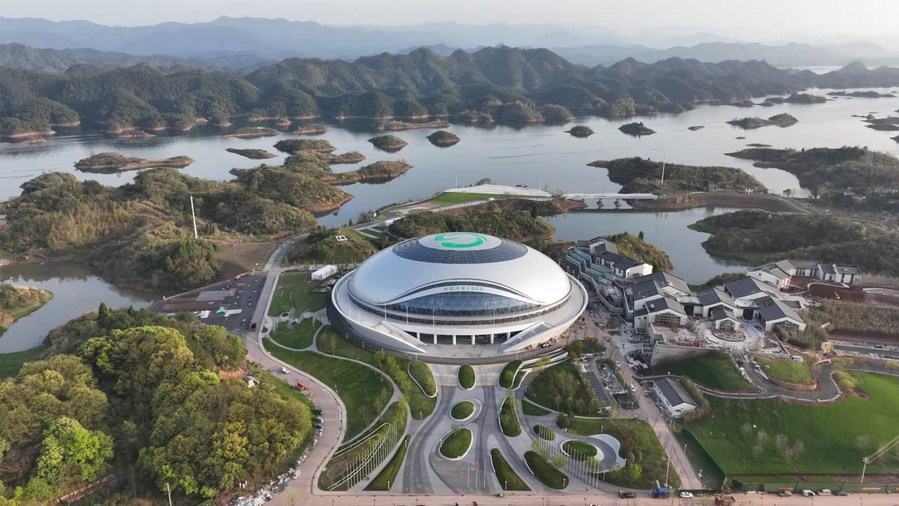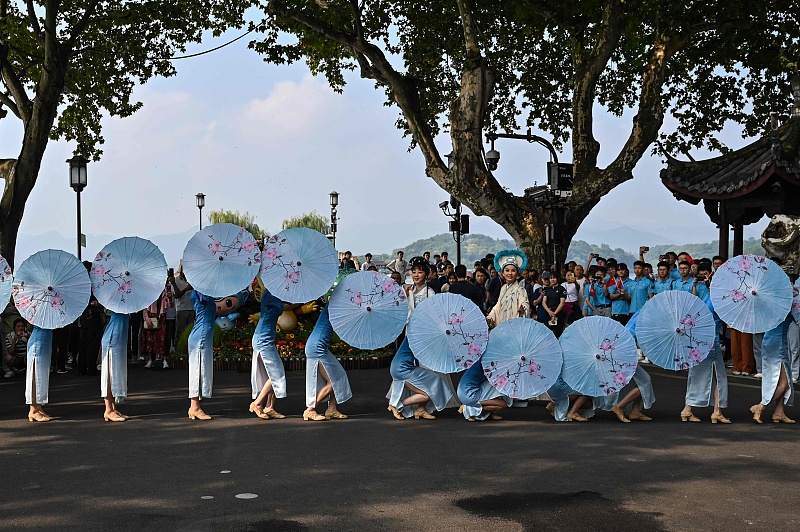
A view of Chun'an Jieshou Sports Center Velodrome, a venue of Hangzhou Asiad in east China's Zhejiang Province, March 28, 2022. /Xinhua
A view of Chun'an Jieshou Sports Center Velodrome, a venue of Hangzhou Asiad in east China's Zhejiang Province, March 28, 2022. /Xinhua
Editor's note: Andy Mok, a special commentator on current affairs for CGTN, is a research fellow at the Center for China and Globalization. The article reflects the author's opinions and not necessarily the views of CGTN.
The legacy of Hangzhou is akin to a river flowing through time, embodying the trinity of technology, commerce and cultural exchange. The Asian Games 2023 adds a modern ripple to this ancient narrative, showcasing a city that harmoniously melds the bygone with the contemporary and the future.
The saga of Hangzhou's evolution is indeed a fascinating narrative, with its roots deeply entrenched in the annals of ancient Chinese innovation. The Grand Canal, a monumental feat of engineering, stands as an enduring emblem of this age-old ingenuity. Stretching over a remarkable 1,794 kilometers, this ancient waterway was the lifeblood of a burgeoning economy, seamlessly knitting the northern and southern realms of China. Its construction, a testament to the zenith of technological prowess of its era, involved the innovative use of locks and gated dams, a pioneering endeavor in hydraulic engineering. This was a time when the wheel of innovation turned ceaselessly, propelling the ancient city into an era of commercial prosperity.
As Hangzhou flourished during the Song Dynasty, it became a bustling hub of commerce and interaction, a nexus where ideas flowed as freely as the waters of the Grand Canal.
Amidst this thriving commercial milieu, emerged the invention of jiaozi, the earliest form of paper money. This wasn't merely a fiscal innovation, but a groundbreaking stride in economic thought, akin to a fresh stream melding with a mighty river, enriching its flow. The issuance of jiaozi facilitated trade, eased transactions and enabled a burgeoning market economy, laying the foundations of a financial system that would evolve through the centuries.
The essence of this ancient commercial fluidity resonates even today, echoed in the modern Chinese lexicon where shui (water), embodies money. The semantic intertwining of water and commerce mirrors the enduring legacy of Hangzhou's ancient innovative spirit and its commercial dynamism. This city, where waterways once pulsed with the vibrancy of trade, now hosts digital rivers of e-commerce, manifesting a continuum of commercial innovation that traverses through time.
Furthermore, the architectural and urban planning of Hangzhou during the Southern Song Dynasty reflected a sophisticated understanding of hydraulic engineering and urban aesthetics. The meticulous planning ensured the harmonious co-existence of the city's urban core with its surrounding waterways. The West Lake, with its serene waters and meticulously designed bridges and pagodas, epitomized this ancient urban elegance, resonating with a profound aesthetic ethos that continues to enchant visitors to this day.

Performers take part in a performance before the start of the Asian Games torch relay in Hangzhou, east China's Zhejiang Province, September 8, 2023. /CFP
Performers take part in a performance before the start of the Asian Games torch relay in Hangzhou, east China's Zhejiang Province, September 8, 2023. /CFP
The Asian Games 2023 serves as a modern-day Grand Canal for Hangzhou, fostering a global arena for sportsmanship and cultural exchange. The Games, enhanced by cutting-edge sporting technologies, resonated with Hangzhou's ethos of commercial engagement and technological innovation, bringing forth a dance of the ancient with the present and the future under the global spotlight.
The cultural exchanges that flourished during the Games were reminiscent of the ancient exchanges once fostered along the banks of the Grand Canal. The rhythmic beat of drums, the elegance of traditional performances, and the shared cheers of diverse nations echoed the city's rich cultural tapestry. The Asian Games brought together disparate cultures, fostering a spirit of unity, camaraderie and mutual understanding.
The digital augmentation of the Games, encompassing state-of-the-art sporting technologies, real-time analytics and immersive viewer experiences, mirrored Hangzhou's modern-day persona as a digital commerce hub. The ebb and flow of data streams during the Games encapsulated the modern essence of Hangzhou, a city that continues to thrive amidst the tides of change.
As the curtain falls on the Asian Games 2023, Hangzhou is emerging with a rejuvenated identity, portraying a blend of historical richness and modern sophistication. The Games are not merely a sporting event, but a celebration of Hangzhou's unique place in the world — a city that continually navigates the waters of change, embracing the new while honoring the old. The narrative of Hangzhou is a poetic ode to the city's harmonious dance with water — a dance that weaves tales of technological innovation, commercial enterprise and cultural richness.
The Asian Games 2023 spotlighted Hangzhou's strides from the Grand Canal's ancient engineering to modern digital commerce, reflecting a city in flux — ever-evolving, seamlessly melding its rich past with modern dynamism, embodying China's vibrant narrative in a global athletic, cultural, commercial and technological arena.
(If you want to contribute and have specific expertise, please contact us at opinions@cgtn.com. Follow @thouse_opinions on Twitter to discover the latest commentaries in the CGTN Opinion Section.)